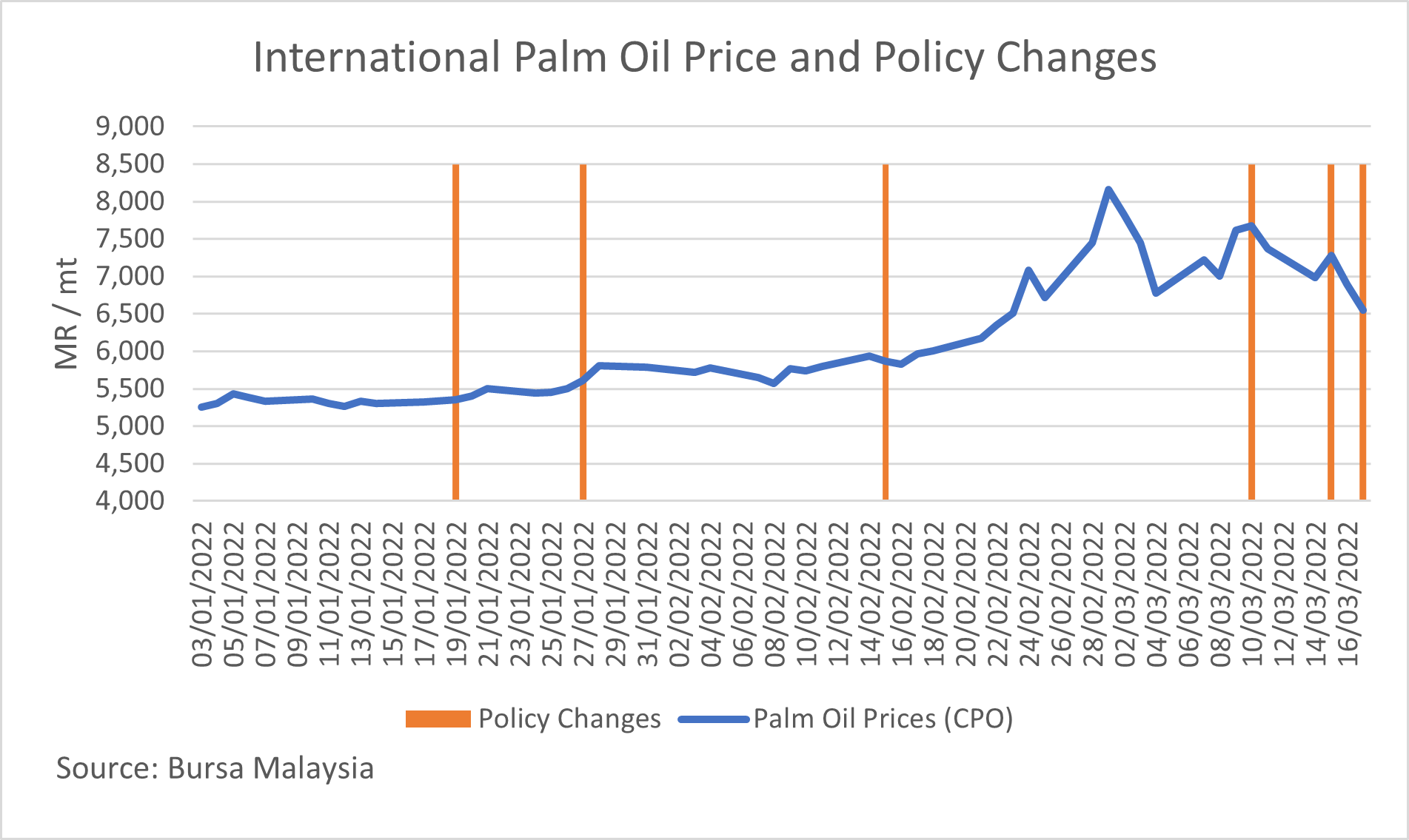Indonesia Announces the Sixth Policy Change to the Palm Oil Market since January

In an attempt to bring domestic cooking oil prices under control, Indonesian authorities announced yet another policy change on Thursday (March 17th). This is the sixth policy change since the start of January. Most of these policies did not have the desired effect on the domestic availability of cooking oil or on prices.
In the latest announcement, the domestic market obligation (DMO), introduced late in January and revised two more times since then, was totally scrapped and replaced by an export levy. According to Indonesia’s Trade Minister, the difference between market prices and the DMO was being exploited, leading to the reversal of the policy. Policy changes since January were as follows:
January 19th. The Indonesian government sets a fixed price for all packaged cooking oils of Rp 14,000 / liter for households and small businesses. Despite these price caps, cooking oil was still sold above Rp14,000 / liter in informal markets as a result of domestic shortages. Starting from January 24th, exporters will need to get a permit from the ministry of trade for crude palm oil, used cooking oil, and RBD palm oil exports. Previously exporters only needed to make a customs declaration for these exports.
January 27th. Indonesia announced the domestic market obligation (DMO) policy. Under the DMO, oil producers are required to sell 20% of crude palm oil, used cooking oil, and olein in the domestic market. A price cap of Rp 9,300 / liter for crude palm oil and Rp 10,300 / liter was introduced. In February palm oil prices soared to record highs, and these DMO measures were one of the drivers pushing palm oil prices to record highs, another being the war between Russia and Ukraine.
February 15th. The DMO policy is expanded to include all palm oil products. Previously, only crude palm oil, used cooking oil and olein had DMOs. This led to delays in Indonesian exports, as the new policies caused some confusion.
March 10th. The DMO for crude palm oil was raised from 20% to 30%, meaning palm oil producers were required to sell 30% of their planned production volumes domestically. International palm oil prices jumped right after the announcement was made, on March 9th. Prices dropped shortly after that as crude oil prices started to slip.
March 15th. On Tuesday, Indonesia removed the price cap (of Rp14,000 / liter) on packaged cooking oils as mandated on January 19th. Authorities also raised the price cap on bulk oils from Rp 11,500 / liter to Rp 14,000 / liter, and will provide subsidies for bulk cooking oil purchases. Indonesia has already been struggling with a domestic scarcity and the situation worsened, as traders jumped to buy and stockpile more cooking oil.
March 17th. On Thursday, Indonesia announced that it will scrap the domestic market obligation (DMO) and replace it with a levy instead. Under the new levy system, export taxes are coupled to the base price of crude palm oil and can rise to a maximum of USD 675 / mt when crude palm oil prices reach USD 1,500 / mt. The previous maximum export tax was capped at USD 375 / mt. The announcement was seen as having a neutral effect on prices, but prices dropped slightly on Friday due to external factors.
Indonesia has been plagued by domestic shortages and an unprecedented rise in palm oil prices of more than 45% over the last six months. Palm oil prices seem to be on the retreat and dropped 6% for the week ended 18 March which could mean fewer changes to policies in the near future. The many policy changes by Indonesian authorities have caused confusion and complicated the export process. There is a call for consistency from some of the largest palm oil producers.







